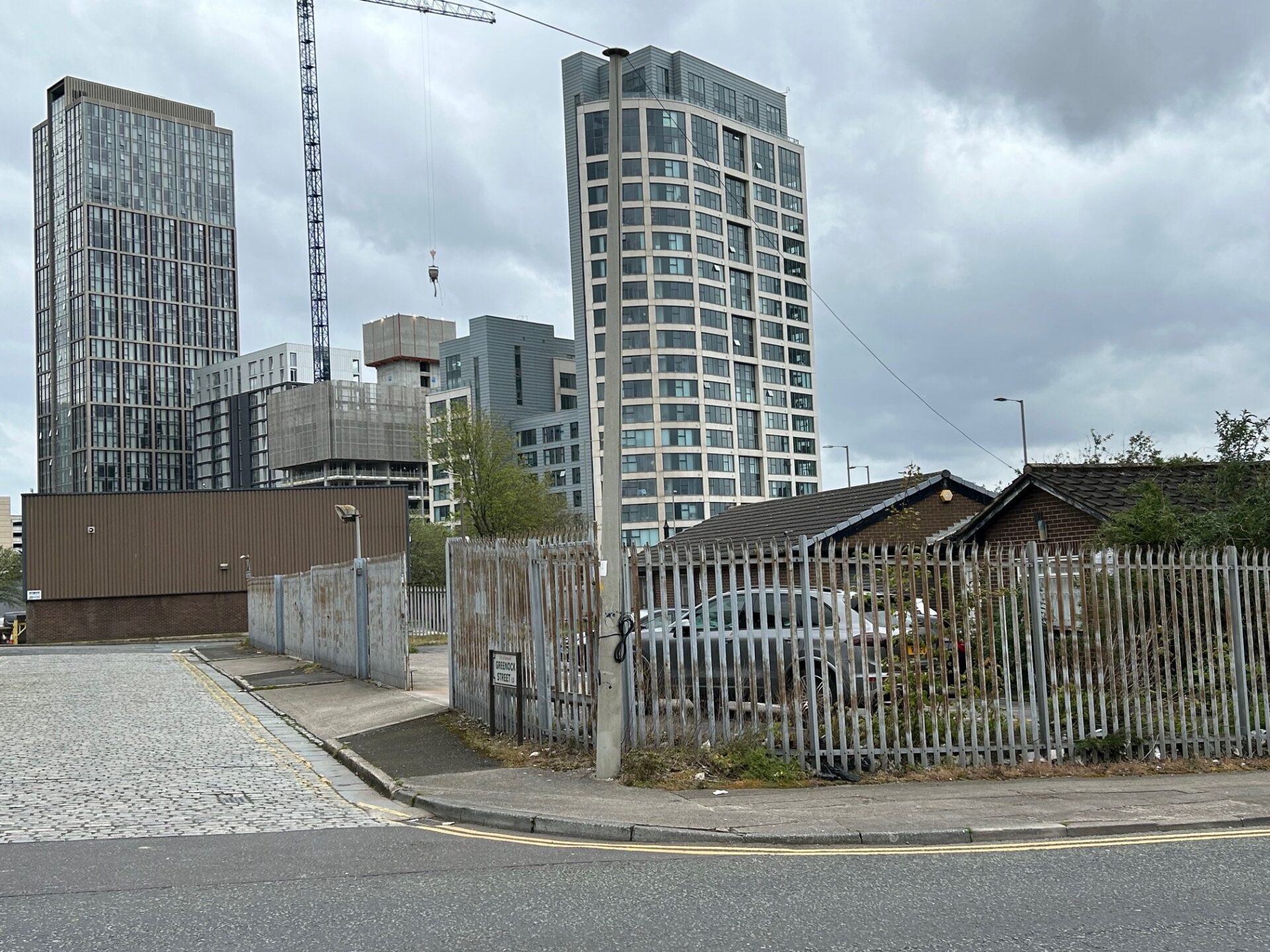The Subplot
The Subplot | Liverpool mayor, Manchester unlockdown, Ancoats row
Welcome to The Subplot, your regular slice of commentary on the North West business and property market from Place North West.
This week: the hunt begins for a new Liverpool mayor which could mean a rethink of regeneration policy. Green protesters are in court about Manchester car park plans. Meanwhile, Manchester’s city centre occupiers and landlords start talks with health authorities about their ‘unlockdown’ strategy. It’s going to be a busy seven days, but Subplot has your back.

MAYOR OVERBOARD
 Goodbye Joe
Goodbye Joe
On 31 December, Liverpool City Council’s two-term directly elected mayor Joe Anderson stepped aside. It followed his arrest earlier in the month as part of a Merseyside Police investigation into corruption. He was bailed to 19 February. A new Labour candidate will be needed for the elections due this year.
Property industry reaction has been a mixture of eye-rolling and genuine respect for Mayor Joe’s energy.
Stuart Keppie, partner at Keppie Massie, says: “The most important thing for a new mayor is collaboration with Steve Rotheram, it could help on a lot of issues and projects.” Andy Delaney, director at property regeneration consultancy Aspinall Verdi, says: “It would be good to see a mayor less reactive to the latest short term hot trends, less focused on pleasing local audiences, thinking bigger, and big picture.” A clear-out at official level in the city council is also high on many property people’s wishlists. But who will fill Joe’s shoes?
Hello Wendy, Ann and Barry
The key dynamic within the ruling Labour Group is about whether you are, or are not, a member of Team Anderson. Top of the list of potential replacements is acting mayor Wendy Simon, Anderson loyalist and cabinet member for tourism and culture. She is more centrally placed on the Labour policy spectrum and probably better able to get along with City Region Mayor Steve Rotheram, whose think-before-you-speak attitude property people much prefer to shoot-from-the-hip Joe. But does she want the job? Simon has yet to respond to Subplot’s enquiry amidst speculation she is reluctant to take the job full-time. Next comes Ann O’Byrne, whom Simon narrowly ousted as Labour’s deputy leader and yes, you guessed, O’Byrne is definitely not a member of Team Anderson. In 2018, she resigned from the cabinet saying Anderson “wasn’t listening.” O’Byrne did not respond to a request to talk about the mayoralty. A potentially emollient third choice is Barry Kushner, who tags himself @bazkush on Twitter. Since October, Kushner has been the cabinet member for housing and regeneration, and the one the property industry meets most.
Subplot talks to Bazkush
So we gave Cllr Kushner a call. He says he doesn’t yet know if he’ll stand, because the candidate selection process could be taken out of local hands, and as yet there are no arrangements in place. Policy-wise a Kushner mayoralty would accelerate some existing trends the property scene has been viewing with interest, particularly neighbourhoods and the idea of the 15-minute city. Kushner says: “Paddington Village is a good example of the kind of scheme that’s successful. We’ve got the Royal College of Physicians, a new hotel to provide entry-level jobs, we’re extending the city centre and we’ve opened land for housing. In principle, you should be a 15-minute walk from everything, and these days the city centre with its large residential population is a neighbourhood in its own right.”
Something for the locals
Kushner explains: “We need to look at retaining the integrity of some city districts, we mustn’t let development get out of control. Areas like the Fabric District can’t just be student accommodation. We need a neighbourhood approach and to pursue an inclusive growth strategy that has to mean something for local people.” Does this mean rowing back from enthusiasm for big city office schemes? No, says Kushner. “Though there is clearly a lot more to do on inclusive growth.” The 400,000 sq ft Kier Property/CTP Pall Mall office scheme will be a test case. In December, Leonardo Hotels signed up for a 284-bed upscale four-star at Pall Mall. Kier and CTP say they intend to start construction in the autumn, but will the office element begin at the same time? Kushner hints it might be possible.
What was that about Pall Mall?
Yes, interesting, and perhaps a sign of things to come for the £200m scheme. Pressed to say if Liverpool City Council would consider the kind of tactical lease-wrap that Salford City Council granted to get the Greengate Exchange office development moving, Kushner sounds sympathetic. He says: “We want to get these things moving within our financial capacity, and we don’t rule anything out,” and pointed as an example to council-led development of the 160,000 sq ft Spine Building at Paddington Village. He adds: “We’ve already had expressions of interest in the office space.” However, several voices in the city property market wonder if this could work. “The project must have been appraised on rents over £25/sq ft, and that makes things difficult, I just don’t know,” one tells Subplot. Others simply don’t like the location.
We get a new mayor and all goes smoothly
Absolutely not, says at least one expert. Selection may end up in the hands of the national party, leading to tensions and resentments. More generally Anderson is the third Liverpool council leader in a row whose time in office ended under a cloud (Google Warren Bradley and Mike Storey). Once is an accident, twice is bad luck, three times is….’boss politics’, says Dr Stuart Wilks-Heeg, reader in politics at Liverpool University. He explains: “Liverpool has a long history of boss politics, big city leaders with big personalities driving a political machine. And boss politics is quite unstable because big bosses build up big oppositions. Given that, it’s remarkable Anderson survived so long. And one of the inevitable consequences of boss politics is bosses leave under a cloud.” Pressed to explain why, Dr Wilks-Heeg says: “I don’t think Liverpool politics is deeply corrupt but the trouble with boss politics generally is people can stray beyond democratic norms in order to stay boss, or to undermine the boss.”
So strap yourself in, it’s going to be a bumpy ride.
DRIVING THE WEEK
 Manchester’s unlockdown
Manchester’s unlockdown
The English lockdown has spurred business campaign group UnitedCity to work on a vaccination-linked city centre ‘unlockdown plan’. But will Manchester’s big corporate occupiers bring their staff back to the office in 2021?
You will be shocked
“When people come back to work in central Manchester, they will be shocked. They will wonder where the f*** all the places they knew have gone,” says Will Lewis, director of OBI and one of the moving spirits behind the property-dominated UnitedCity lobby group campaigning to revive Manchester city centre. This week, Lewis and a team from UnitedCity are working on new plans for a “work from work” campaign to revive the infrastructure of bars, restaurants and culture that makes the city what it is. It will be yoked to public health targets, testing and vaccination. This week they are agreeing what Lewis calls a “timetable for a timetable” for a post-lockdown return to work, in talks with public health officials.
A workable timetable
Lewis says: “We’ve got to be realistic with dates. There’s no point suggesting everything will be open by mid-February, because this has to be linked to progress on vaccination. We want a road map that provides some certainty, and a plan to help businesses return to work.” This involves helping office occupiers with their own testing operations, and working with local track-and-trace services. Manchester Town Hall is in the loop, although the council insists that for now its focus is squarely on the pandemic and not on a return to work. Greater Manchester Combined Authority told Subplot it was in regular touch with UnitedCity.
Achilles’ heel
The major obstacle to success, apart from the coronavirus itself, is that major corporate and overseas-owned occupiers will not lead a return to working from work, but will stick with their remote working policies. Lewis explains: “We need heavyweight buy-in from corporate Manchester and local government. If occupiers like Barclays aren’t back here in the city centre it makes a huge difference.”
UnitedCity worries that the corporates will still work from home. Lewis: “We already saw this in the summer 2020 return to work. The SMEs and local business were behind it but the big corporates shut up shop. This time they’ve really got to get behind it. If the message from the big city centre employers is they’re out until 2022 then we’re in trouble because when the city centre reopens it has to be a real reopening. If we can’t generate support from corporates and the big US enterprises, then we’re in danger.”
Gentle pressure
Senior figures at Manchester Town Hall appreciate that corporate buy-in will be the Great Unlockdown’s greatest challenge. “The big corporate office occupiers have a civic responsibility,” says one well-placed council source who goes on to admit that gentle pressure may be needed to curtail working from home. GMCA says it is confident that Greater Manchester’s employers of all sizes will support the recovery, adding: “That’s been the message from all of our discussions”. For now, lockdown probably has three more months to run. But one day soon this Achilles’ heel will be sorely tested.
LITERALLY DRIVING THE WEEK
(Car) parks & recreation
The judicial review of plans to turn the 10-acre former Central Retail Park in Ancoats into a temporary car park opened in court on Friday. A decision is expected any day. But whatever the outcome, have the protesters won?
A basket caseload
Manchester City Council bought the retail park in 2017, paying a reported £37m in a deal with Nuveen. A series of about-turns and rethinks have seen plans for housing on the site ditched to be replaced with 500,000 sq ft of offices, then, in February last year the office scheme doubled to 1m sq ft as part of the city’s first zero carbon business district. In the meantime, the council proposed five years of temporary surface level car parking. For the past 14 months, that plan has been on hold while protest group Trees Not Cars challenges the decision in the courts.
The score so far
Protesters are already banking a win, in so far as they’ve prevented whatever carbon output 14 months of surface car parking would have produced. They reckon that adds up to 169,000 tonnes of carbon dioxide. They are also celebrating the council’s move to cut the car parking plan to two years, and some remarks in court on Friday which protesters are spinning might mean the council has all but given up on the car park idea anyway. They blame the original property deal for everything. Claire McDonald, speaking for Trees Not Cars, says: “This is being driven by the council trying to recoup the £37m they spent on the site…It’s a very bad deal which has trapped them into really bad solutions. The sale price was a hell of a lot of money and it has meant profits before people.”
Spring shoots
The protesters may also be on to a winner if decent-sized city centre parks are now firmly on the city council’s agenda. Subplot has been told there is the prospect of further announcements about city centre greening this spring. “There will be deeds, not just words,” predicts one senior city council insider, who adds, “There is real political support.” New six- or seven-acre parks at NOMA and Mayfield are already in progress but there’s much more greenery coming, Subplot is told, as the council attempts to make good on its climate crisis pledges. As for Ancoats, a city council spokesperson says: “You’ll understand we’re not going to say much ahead of judicial review and it will be a number of months before development plans are put forward. Not least because the site is being used as a Covid test centre at the moment and for the foreseeable future.”
Who is next?
The protesters are unlikely to go quietly, whatever the result of the judicial review. Claire McDonald says their attention is now turning to General Projects’ consented scheme for 325,000 sq ft of offices and a two-acre park at New Islington. McDonald says: “It feels like placemaking is a tick-box operation for the councils and developers, it is not done properly and not involving the community. They are hearing us, but not listening”. The Ancoats site may, if it is lucky, scoop a major civil service relocation or technology giant, but with lockdown fuelling demand for more green spaces, you can be sure that Ancoats will not be green campaigners’ last hurrah.
IN CASE YOU MISSED IT
How do you price 2025?
The hunt for forward funding is now in progress, as One Heritage presses on with £160m plans for a 55-storey apartment tower at Salford Greengate.
The 545-unit tower will start this quarter after a short delay due to the pandemic, Place North West reported last week. The coronavirus cannot be entirely blamed for the slowdown in residential, and particularly Build to Rent starts, which pre-dates the pandemic by as much as a year, as Savills/BPF figures show. One Heritage decision to press green-for-go says less about 2021 and more about its hopes for the market in 2025, when the tower is due for completion. “One Heritage Tower Limited are currently exploring exit options including a forward fund deal with institutional funds. The directors estimate that the gross development value of the completed scheme will be approximately £160m,” the developer says in a statement. Given that pricing January 2021 is headache-making, pricing 2025 could be asking the impossible.
Coworking’s Big Bet
Coworking brand Hana has taken a second Manchester hub, as the city office market tools-up for a return to work later this year. CBRE’s flexible workspace arm signed up for 32,000 sq ft at Barings Real Estate’s 180,000 sq ft block, near St Peter’s Square. This follows a 2020 signing of 26,000 sq ft at Fore Partnership’s Windmill Green on the other side of the square. The expectation is that, just as coworking was one of the first to suffer from social distancing and pandemic disruptions, its low-commitment model means it will be one of the first to benefit from a return to work. Coming in the week that WeWork revealed doubts about long-term liquidity and disclosed UK operating losses spiralling to £231.6m in the palmy days of 2019, operator optimism is all the more remarkable.
The Subplot is brought to you in association with Cratus, Bruntwood Works and Savills







It’s all very well Local Government collaborating with the big corporates to give their workforces the ‘stick’ to return to work, but where is the transport systems to support the ordinary folk getting in to work? Over the last 20 years local Government has worsened car journeys to try and encourage greater levels of public transport, yet public transport is often over crowded and unreliable. Is it any wonder workers have enjoyed the extra hours and reduced stress that home working can bring, whilst improving efficiency and costs for the employer? Local Government has a lot to answer for and it needs to start responding to its work force rather than trying to dictate the way those people need to work and move around the city.
By NT